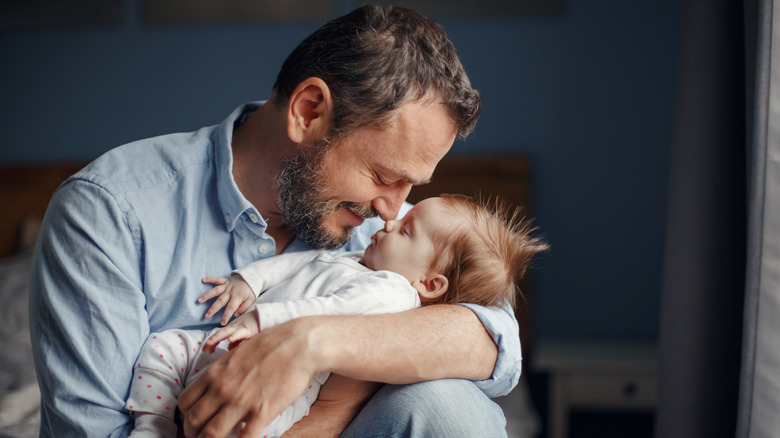BrainHQ's Dr. Henry Mahncke On How Parenthood Changes The Brains Of New Dads Versus New Moms - Exclusive
From the late-night feedings to scheduling life around naptime, change is inevitable once you have a child. Both the brain and the body are forever altered, too, once a person becomes a parent.
While a mother's body goes through all sorts of ups and downs throughout pregnancy and beyond, fewer people know that fathers' brains and bodies are also affected deeply once they take on the title of "dad." However, the biggest difference is that these changes to the male brain begin occurring months later than a mother's.
"The first time the father holds a child in his arms, he feels, smells, sees, and hears the baby that he and the mother-to-be have been anticipating — this beautiful little girl or this precious little boy. What a moment that is! It's incredibly rewarding in the brain," neuroscientist and CEO of BrainHQ, Dr. Henry Mahncke, said during an exclusive interview with Health Digest.
From that moment on, both mothers' and fathers' brains begin changing in order to help them through the next phase of their lives — with a few key differences.
A father's brain undergoes major changes after first seeing his child
As soon as a baby is brought into the world, a mother's brain begins to produce more of a chemical called oxytocin. This helps create that immediate attachment between mother and child, something that a father only begins to experience himself once he picks up his newborn.
"One of the biggest changes that happens is [that] as a new dad spends time with a new baby, caring for the newborn and caring for the mom, he experiences hormonal changes," Dr. Henry Mahncke told us. "Oxytocin is released, while testosterone goes down and estrogen increases. These hormones cause changes in brain networks and function, which then promote more caring behaviors from the new dad."
As both mothers and fathers begin raising their children, their brains quickly begin to adjust to their new lives together. After all, there's a whole lot to learn: your little one's personality, their hunger cues, and a million other things. It's then that the paternal instinct becomes just as strong as the maternal one. "Over thousands of hours of child-rearing, that attachment grows progressively as the child becomes an extension of self in the brain of the parent," Dr. Mahncke said.
BrainHQ specializes in developing digital brain exercises that can help improve brain health. For more information on their evidence-based exercises, visit the BrainHQ website.


